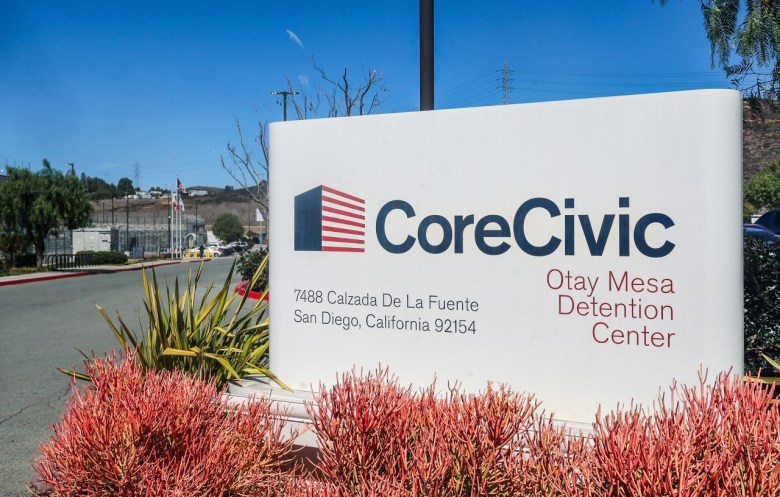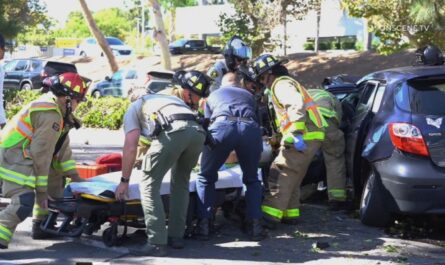Capital & Main generated this story. Permission is granted for its publication here.
Jos put a stack of paper towels on the chair and carefully lowered himself down when he sat at the table in mid-June for his turn before an immigration court.
The lawyers for Jos and the U.S. government, together with Immigration Judge George Najjar, appeared on a video screen mounted on the wall of the courtroom inside the Otay Mesa Detention Center in San Diego. Jos, who is not being fully identified because of fears of retaliation, raised his hand to speak while the court and his lawyer exchanged opinions regarding the progress of Jos’ case.
The lawyers and the judge didn’t notice.
Jos broke his quiet as the judge concluded the session.
He said in Spanish, “I have something to explain to the judge about what is happening to me.” I’m in a lot of pain since I have cancer. Here, no medical care is provided. I’m bleeding daily.
A container of crimson blood was taken out and placed on the table before him. There was a collective gasp from many in the courtroom.
“This is my proof,” Jos stated. I lost this much blood today.
He has been seeking treatment for what he claims is colon cancer ever since he was arrested by Immigration and Customs Enforcement in January. Jost told Beyond the Border that he has not received the appropriate medical care from ICE or CoreCivic, the private jail operator that operates Otay Mesa Detention Center.
A request for comment from ICE was not answered. According to CoreCivic, Jos’ requirements are being met and he is constantly observed.
According to Kaiser Permanente medical records, Jos visited an emergency room in Los Angeles in April 2024, when medical professionals noted anemia and rectal bleeding, among other health issues. Records show that the doctors attempted to hospitalize him but were unable to find any beds, so they sent him home with instructions to get a colonoscopy as soon as possible.
According to court documents, Jos was caught shortly after picking up a fellow Guatemalan guy who lacked authorization to stay in the United States, close to Tecate, California. He was sent to the U.S. Marshals Service’s custody in Otay Mesa Detention Center.
Jos claimed that although he informed the facility’s staff about his ailment upon admission, he was never given the necessary therapy.
According to court documents, Jos entered a guilty plea to one felony count of transporting specified aliens. The judge waived his fine and sentenced him to time served; however, upon his release from criminal jail, he was placed in ICE custody and sent to the same facility, where he was battling deportation.
He informed the Otay Mesa Detention Center’s medical personnel that he had colon cancer as soon as he arrived, according to January medical records.
During the mid-June court hearing, Judge Najjar questioned the ICE lawyer about why Jos wasn’t receiving medical care.
Christine Rutherford, an ICE lawyer, informed the judge that the agency was awaiting CoreCivic’s evaluation of whether it could offer the care that was sought or if he would have to be sent to another detention center.
Jos questioned Najjar about the judge’s willingness to let him go so he could receive therapy.
“I sense it in my body,” Jos remarked. Little by little, I’m dying.
But according to Najjar, Jos’ criminal conviction means that he must be held in custody by law. This is due to the fact that Jos’ conviction is one of several offenses that are classified as serious felonies. Under immigration law, those offenses, which are a combination of felonies and misdemeanors in the criminal context, carry especially harsh penalties.
“I don’t feel sorry for you,” Najjar remarked. I simply lack the authority to take any action. I have no power to carry out your wishes.
At a subsequent session, approximately two weeks later, Najjar pressed the ICE lawyer once more for details regarding Jos’ medical care. She discovered that CoreCivic had arranged for Jos to get a colonoscopy, but the lawyer was unsure of the exact time.
Najjar informed Jos and his lawyer that if they wanted to demand greater care, they would have to take their case to federal district court because he had no control over the matter.
Jos reported feeling lightheaded before the judge at the conclusion of the session. A guard arrived to take him to the medical unit as soon as the hearing was over. However, Jos’s wife claims that the professionals there did little to help him and that he returned to his unit in the same condition.
Jos had a bond hearing on Thursday to ask to be released from custody in exchange for his pledge to appear in court.
Jos requested the guard of the detention facility if he might leave the courtroom to grab a sip of water while he was waiting on a bench prior to that hearing. He claimed to be feeling under the weather.
He was obviously in discomfort as he moved slowly. Jos did not return while Immigration Judge Guy Grande worked through the afternoon cases. Jos insisted on staying for his hearing despite a guard’s voice in the hallway urging him to go to the medical unit.
Get neighborhood news in your inbox. It’s free and enlightening.
Become one of the 20,000+ individuals who receive breaking news alerts and the Times of San Diego in their inbox every day at 8 a.m.
Weekly updates from San Diego communities have also been provided! You acknowledge and agree to the terms by clicking “Sign Up.” Choose from the options below.
He was in a wheelchair and hunched over in what appeared to be suffering as he returned to the courtroom for his turn.
His lawyer maintained that the U.S. Constitution should permit his release because it was cruel to imprison him without addressing his medical condition, despite the fact that his criminal conviction required obligatory incarceration.
Jonathan Grant, the ICE lawyer, contended that Jos’ criminal conviction necessitated his detention. According to him, on June 11, CoreCivic employees indicated that Jos does not currently have a confirmed diagnosis of colon cancer. In August, Jos would get a colonoscopy, he noted.
Grande consented to ICE’s request that Jos be held without bond. Jos put up his hand to speak, but the court instructed him to ask his lawyer questions instead. As the judge went on to another case, Jos gave a feeble shake of his head. The duration of the hearing was sixteen minutes.
Jos was wheeled to the entrance by a guard. He tilted his head sideways. He didn’t glance up, even though his wheelchair remained in the doorway for a few minutes.
Award-winning organization Capital & Main covers the most important economic, environmental, and social concerns of our day from California. These issues include immigration, hate and extremism, health care, economic inequality, climate change, and dangers to democracy.
Copyright Capital & Main, 2025

 by
by 

